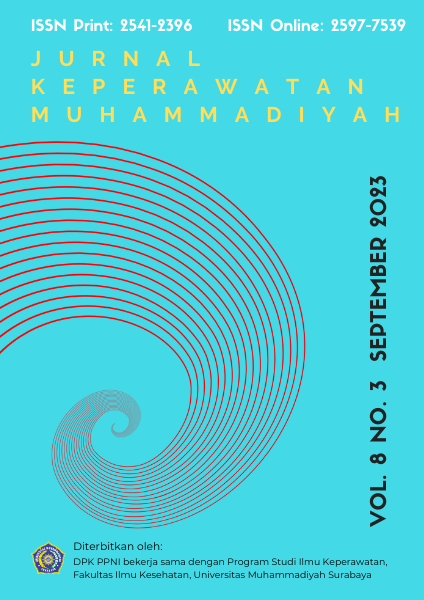Hubungan Tingkat Pendapatan Keluarga dan Pola Asuh Orangtua dengan Status Gizi Anak Balita di Desa Sepatan Kelurahan Sepatan Kabupaten Tangerang Banten Tahun 2022
DOI:
https://doi.org/10.30651/jkm.v8i3.17452Keywords:
Family Income, Nutrition Parenting, Nutritional StatusAbstract
Background: Toddlers are a golden period of growth, in their development of course they require high levels of nutrients. Family income can affect nutritional status. The toddler period is very dependent on the mother or caregiver so that its growth and development also depend on the pattern of nutritional care. The results of initial observations are that relatively many toddlers are below the red line.
Objective: This study aims to determine the relationship between family income and the nutritional status of children under five, to determine the relationship between parenting styles and the nutritional status of children under five in Sepatan Village, Sepatan Subdistrict, Tangerang Regency, Banten in 2022.
Methods: This research is explanatory research. The research method used is a survey with a cross sectional approach and regression. The research population consisted of 283 children under five, a sample of 166 children under five
Results: Relatively family income 59.6% is quite good, relatively 89.8% parenting style goes quite well, relatively 71.7% of children under five still have poor nutritional status, analysis of the relationship between family income, nutritional care pattern on status nutrition relatively shows no significant relationship, 0.763>0.05 the dominant factor affecting the nutritional status of toddlers is the provision of nutritious supplementary food.
Conclusion: Income and parenting style do not significantly affect the nutritional status of toddlers, it is found that the dominant factor influencing the nutritional status of toddlers in Sepatan is the provision of nutritious supplementary food for toddlers that has an effect of 0.880 or 88% on improving the nutritional status of toddlers, mothers should optimize the role of posyandu especially in monitoring the weight and height of children under five on a regular basis, especially growth in these children under five.References
Amy Prahesty. (2006). Hubungan Pola Asuh Gizi dengan Gangguan Pertumbuhan (Growth Faltering) pada Anak Usia 0-12 Bulan di Kecamatan Sumowono Kabupaten Semarang. Skripsi S-1. Universitas Diponegoro
Hasrul, H., Hamzah, H., & Hafid, A. (2020). Pengaruh Pola Asuh Terhadap Status Gizi Anak. Jurnal Ilmiah Kesehatan Sandi Husada, 9(2), 792-797.
Kementerian Kesehatan RI. Riskesdas (2018) [Internet]. Riset Kesehatan Dasar 2018. Tersedia pada https://www.litbang.kemkes.go.id/laporan-riset-kesehatan-dasar-riskesdas/.
Marpaung, R. V. P., Samodra, Y. L., & Harjosuwarno, S. S. (2021). Hubungan Pola Asuh Terhadap Status Gizi pada Anak TK di Kota Yogyakarta. Jurnal Ilmiah Kesehatan Media Husada, 10(1), 1-9.
SDG, U. (2019). Sustainable development goals. progress report. Tracking SDG.
Soetjiningsih. (2013). Gizi Untuk Tumbuh Kembang Anak. Jakarta: Kedokteran Anak
Supariasa. (2018). Penilaian Status Gizi. Jakarta Penerbit Buku Kedokteran EGC.
World Health Organization. (2017). World health statistics 2017: monitoring health for the SDGs, sustainable development goals. https://www.who.int/publications/i/item/9789241565486.Published 2017.
Yosefa, P. S., & Tahun, O. D. (2022). Pengaruh Pemberian PMT Lokal Terhadap Peningkatan Status Gizi Pada Balita Gizi Kurang. Syntax Literate; Jurnal Ilmiah Indonesia, 7(6), 6857-6864.
Downloads
Published
Issue
Section
License
Copyright (c) 2023 Masluroh Masluroh, Lusi Haryanti

This work is licensed under a Creative Commons Attribution-ShareAlike 4.0 International License.
- Penulis tetap memegang hak atas karyanya dan memberikan hak publikasi pertama kepada jurnal ini yang secara simultan karya tersebut dilisensikan di bawah:Â Creative Commons Attribution-ShareAlike 4.0 International (CC BY-SA 4.0)













